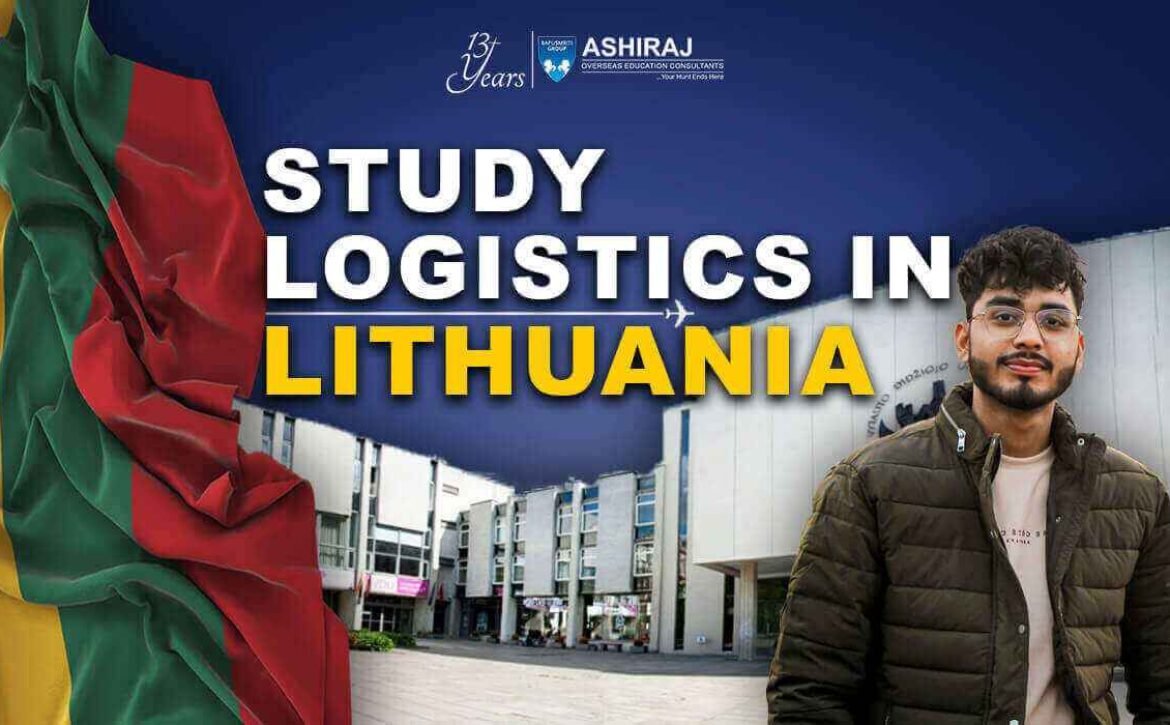
Logistics in Lithuania
Logistics in Lithuania plays a pivotal role in the country’s economic landscape, serving as a key facilitator of trade and commerce. Nestled in the heart of the Baltic region, Lithuania boasts a strategic geographic location that positions it as a crucial logistics hub connecting Eastern and Western Europe. The country’s well-developed transportation infrastructure, including an extensive road and rail network, as well as modern seaports, enhances its capacity for efficient cargo movement. Additionally, Lithuania’s commitment to technological advancements in logistics further strengthens its competitive edge in the global supply chain.
Logistics in Lithuania encompasses a comprehensive ecosystem that addresses the complexities of modern commerce. With a focus on, this dynamic sector encompasses warehousing, transportation, and supply chain management, contributing significantly to the nation’s economic growth. The integration reflects the vital role that logistics plays in Lithuania’s business environment, emphasizing the country’s commitment to optimizing the movement of goods and fostering international trade relations. As Lithuania continues to position itself as a logistical powerhouse, the seamless integration of efficient systems and cutting-edge technologies ensures sustained growth and prominence in the global logistics arena.
Why to Study Logistics in Lithuania?
- Strategic Geographic Location: Lithuania’s central location in Europe makes it an ideal place to study logistics, offering insights into the dynamics of trade and transportation connecting Eastern and Western Europe.
- Advanced Infrastructure: The country boasts a well-developed infrastructure, including a sophisticated network of roads, railways, and modern seaports. This provides students with hands-on experience in managing diverse transportation modes.
- Global Connectivity: With a strong focus on international trade, studying logistics in Lithuania provides exposure to global supply chain networks, preparing students for careers that transcend national borders.
- Technological Integration: Lithuania is at the forefront of adopting technological advancements in logistics. Students can explore innovative solutions and gain practical knowledge in implementing cutting-edge technologies within the logistics sector.
- Economic Significance: Logistics plays a pivotal role in Lithuania’s economy, contributing significantly to its growth. Studying logistics here offers a unique opportunity to understand the direct impact of logistics on a nation’s economic development.
- Multilingual Environment: Lithuania’s multilingual environment facilitates a diverse and inclusive learning experience, preparing students for international collaboration and communication in the logistics industry.
In conclusion, choosing to study logistics in Lithuania provides a holistic educational experience, combining strategic location, advanced infrastructure, global connectivity, technological integration, economic significance, and a multilingual environment. underscores the nation’s prominence in this field, making it an attractive destination for aspiring logistics professionals.
Top Universities to Study Logistics in Lithuania
Rank | University | QS World University Ranking 2023 | Type of University | Average Annual Fees | Programs Offered |
1 | Vilnius University | 501-510 | Public | $2,000 – $4,000 | Logistics and Supply Chain Management, International Business |
2 | Kaunas University of Technology | 511-520 | Public | $2,500 – $5,000 | Logistics Engineering, Transport Management |
3 | Vytautas Magnus University | 551-560 | Public | $2,200 – $4,500 | Logistics and Economics, Global Business Logistics |
4 | ISM University of Management and Economics | 601-650 | Private | $5,000 – $7,000 | Logistics and Digital Supply Chain, International Business |
5 | Klaipėda University | 701-750 | Public | $2,500 – $5,500 | Maritime Logistics, Logistics Engineering |
List of Top Universities in LITHUANIA for Logistics in LITHUANIA
Lithuania offers a range of top-notch universities renowned for their logistics programs, providing students with excellent academic and practical experiences. emphasizes the country’s educational prominence in the logistics field.
- Vilnius University (Rank: 501-510)
Type: Public
Average Annual Fees: $2,000 – $4,000
Programs Offered: Logistics and Supply Chain Management, International Business
- Kaunas University of Technology (Rank: 511-520)
Type: Public
Average Annual Fees: $2,500 – $5,000
Programs Offered: Logistics Engineering, Transport Management
- Vytautas Magnus University (Rank: 551-560)
Type: Public
Average Annual Fees: $2,200 – $4,500
Programs Offered: Logistics and Economics, Global Business Logistics
- ISM University of Management and Economics (Rank: 601-650)
Type: Private
Average Annual Fees: $5,000 – $7,000
Programs Offered: Logistics and Digital Supply Chain, International Business
- Klaipėda University (Rank: 701-750)
Type: Public
Average Annual Fees: $2,500 – $5,500
Programs Offered: Maritime Logistics, Logistics Engineering
Course Curriculum for Logistics in Lithuania
- Foundational Modules: The logistics programs in Lithuania typically begin with foundational courses covering the fundamentals of logistics and supply chain management. Students gain insights into key concepts, principles, and industry practices.
- Transportation Management: Courses delve into the intricacies of transportation logistics, including modes of transportation, route planning, and optimization. Students develop skills in managing the efficient movement of goods across various channels.
- Warehousing and Distribution: The curriculum emphasizes the importance of effective warehousing and distribution strategies. Topics include inventory management, storage optimization, and the implementation of modern warehouse technologies.
- International Logistics: Given Lithuania’s strategic location, programs often include in-depth studies on international logistics. This involves understanding cross-border trade, customs regulations, and global supply chain dynamics.
- Technology Integration: Recognizing the significance of technology in modern logistics, courses focus on digital solutions, automation, and data analytics. Students gain practical knowledge in implementing and optimizing technological advancements in logistics processes.
- Supply Chain Optimization: The curriculum addresses supply chain optimization strategies, emphasizing cost reduction, sustainability, and risk management. Students learn to analyze and enhance overall supply chain efficiency.
- Internship and Practical Training: Many programs incorporate internships or practical training, providing students with hands-on experience in real-world logistics scenarios.
underscores the comprehensive nature of the logistics education in Lithuania, covering foundational concepts, international perspectives, technology integration, and practical application in the local and global logistics landscape.
Eligibility Criteria & Admission Requirements for Logistics in Lithuania
- Academic Qualifications: Applicants typically need a bachelor’s degree in a relevant field such as logistics, supply chain management, business, or a related discipline. The degree should be from a recognized institution.
- Language Proficiency: Proficiency in English is crucial. Most programs require international students to provide proof of English language proficiency through standardized tests such as IELTS or TOEFL. A minimum score is usually specified.
Language Proficiency Tests:
Test | Minimum Score |
IELTS | 6.5 |
TOEFL | 80 |
- Standardized Tests: Some programs may require standardized test scores like GRE or GMAT. These scores help assess the applicant’s readiness for advanced academic studies.
Standardized Test Scores:
Test | Minimum Score |
GRE | 300 |
GMAT | 550 |
- Passport & Student Visa: Applicants need a valid passport and must obtain a student visa to study in Lithuania. The visa application process and requirements vary, but a letter of acceptance from a recognized institution is usually necessary.
- Academic Certificates: Applicants must submit copies of their academic certificates, including transcripts and diplomas.
- Work Experience: While not mandatory, some programs may prefer applicants with relevant work experience in the logistics or related industries.
highlights the criteria prospective students must meet to pursue logistics education in Lithuania, encompassing academic qualifications, language proficiency, standardized test scores, and necessary documentation.
Documents Required for Studying Logistics in Lithuania
- Passport: A valid passport is a fundamental document for international students. Ensure it has sufficient validity to cover your entire study duration.
- Letters of Recommendation (LOR): Typically, two LORs from academic or professional references provide insights into your character, achievements, and capabilities relevant to logistics studies.
- Statement of Purpose (SOP): An SOP outlines your academic and career goals, explaining why you’ve chosen logistics and how the program aligns with your aspirations.
- Curriculum Vitae (CV): A comprehensive CV highlights your academic and professional experiences, showcasing your qualifications and achievements.
- Official High School Transcripts and Educational Certificates: Submit official transcripts and certificates from high school, demonstrating your academic background and eligibility for higher studies.
- Work Experience Certificate: If applicable, provide a certificate detailing your work experience, especially if it’s in the logistics or related field.
- Proof of Financial Resources: Demonstrate your ability to finance your studies and stay in Lithuania. This may include bank statements, sponsorship letters, or scholarship awards.
emphasizes the documentation required for aspiring students to embark on their logistics education journey in Lithuania. These documents collectively ensure a comprehensive understanding of an applicant’s academic, professional, and financial readiness for logistics studies in the country.
Admission Process for Logistics in Lithuania
- Research Programs: Explore logistics programs offered by renowned universities in Lithuania. Consider factors such as curriculum, faculty expertise, and university reputation in logistics.
- Check Eligibility: Ensure you meet the eligibility criteria, including academic qualifications and language proficiency. Prepare necessary documents like transcripts, certificates, and language test scores (IELTS or TOEFL).
- Standardized Tests: If required, take standardized tests like GRE or GMAT. Achieve the minimum scores specified by the chosen program.
- Compile Documents: Gather essential documents, including passport, letters of recommendation (LOR), statement of purpose (SOP), curriculum vitae (CV), work experience certificates, and proof of financial resources.
- Online Application: Complete the online application form for your chosen logistics program. Pay attention to deadlines and provide accurate information.
- Submit Application: Submit the application along with required documents to the university’s admission office. Some universities may charge an application fee.
- Wait for Acceptance: After submission, wait for the university’s response. If accepted, you’ll receive an acceptance letter.
- Student Visa: Obtain a student visa by submitting the acceptance letter, proof of financial resources, and other required documents to the Lithuanian embassy or consulate.
- Arrive in Lithuania: Once the visa is approved, plan your arrival in Lithuania. Attend orientation sessions provided by the university.
underscores the step-by-step process of gaining admission to logistics programs in Lithuania, from research and eligibility checks to visa acquisition and arrival in the country.
“Education is the most powerful weapon which you can use to change the world.”
Nelson Mandela
Cost of Logistics Course in Lithuania
- Tuition Fees: Logistics programs in Lithuania have varying tuition fees. On average, public universities may charge between $2,000 and $5,000 per year, while private institutions might have higher fees ranging from $5,000 to $10,000 annually.
- Accommodation: The cost of living includes accommodation expenses. On-campus dormitories or private rentals are available. On average, accommodation costs can range from $200 to $500 per month.
- Living Expenses: Monthly living expenses, including food, transportation, and miscellaneous items, are estimated at approximately $400 to $600. This can vary based on personal lifestyle choices.
- Health Insurance: Health insurance is mandatory for international students. The cost is usually around $200 to $500 per year, depending on the coverage.
- Books and Supplies: Budget for textbooks and supplies, which may amount to $100 to $300 per semester, depending on the program’s requirements.
- Travel and Leisure: Consider additional costs for travel and leisure activities. Budgeting around $500 to $1,000 per year for such expenses is a reasonable estimate.
Overall, the cost of studying logistics in Lithuania is relatively affordable compared to many Western European countries. highlights the cost considerations associated with pursuing logistics education in this Baltic nation.
Scholarships for Logistics Courses in Lithuania
Scholarship Name | Eligibility Criteria | Amount | Application Deadline |
Vilnius University Scholarship | Meritorious academic record, strong motivation | Up to $5,000 per year | April 1st |
KTU Global Ambassador Scholarship | International students with outstanding achievements | Full tuition waiver | February 15th |
Vytautas Magnus University Scholarship | High academic performance, active involvement in community | Up to $3,000 per year | May 1st |
ISM Diversity Scholarship | Underrepresented backgrounds, commitment to diversity | Up to $7,000 per year | March 15th |
Klaipėda University Excellence Award | Exceptional academic achievements, leadership qualities | Up to $4,500 per year | June 1st |
These scholarships aim to support students pursuing logistics education in Lithuania. emphasizes the availability of financial assistance for international students interested in studying logistics in this Baltic country. Prospective applicants should carefully review the eligibility criteria, scholarship amounts, and application deadlines to maximize their chances of securing financial aid for their studies.
Career Opportunities After Logistics in Lithuania
Job Profile | Description | Average Salary (per annum) |
Logistics Manager | Overseeing logistics operations, optimizing supply chains | $40,000 – $60,000 |
Supply Chain Analyst | Analyzing and improving supply chain efficiency | $35,000 – $50,000 |
Transportation Coordinator | Planning and coordinating transportation logistics | $30,000 – $45,000 |
Warehouse Manager | Managing warehouse operations, inventory control | $35,000 – $55,000 |
Procurement Specialist | Sourcing and negotiating with suppliers | $35,000 – $50,000 |
Average Salaries are indicative and may vary based on experience, location, and company size.
Logistics in Lithuania opens up diverse career opportunities with competitive salaries. Graduates can pursue roles such as Logistics Manager, overseeing entire operations, or work as Supply Chain Analysts, focusing on optimizing supply chain efficiency. Transportation Coordinators plan and manage transportation logistics, while Warehouse Managers handle warehouse operations and inventory control. Procurement Specialists are involved in sourcing and negotiating with suppliers. emphasizes the promising career prospects in the logistics field in Lithuania, showcasing the variety of roles and corresponding average salaries available to graduates in this dynamic industry.
Frequently Asked Questions About Logistics in Lithuania
Some top universities in Lithuania for logistics include Vilnius University, Kaunas University of Technology, and Vytautas Magnus University.
Tuition fees vary, but on average, public universities charge between $2,000 and $5,000 per year, while private institutions may range from $5,000 to $10,000 annually.
Yes, various scholarships are available, such as the Vilnius University Scholarship, KTU Global Ambassador Scholarship, and others, providing financial support.
Yes, English proficiency is required. Commonly accepted language tests include IELTS and TOEFL, with minimum scores specified by each program.
Some programs may require GRE or GMAT scores. Applicants should check the specific requirements of their chosen program.
Required documents include a valid passport, academic certificates, letters of recommendation, statement of purpose, CV, and proof of financial resources.
The average cost of living, including accommodation, food, and miscellaneous expenses, is estimated to be between $600 and $800 per month.
Yes, international students are allowed to work part-time during their studies, usually up to 20 hours per week.
Graduates can pursue careers as Logistics Managers, Supply Chain Analysts, Transportation Coordinators, Warehouse Managers, and Procurement Specialists.
After receiving an acceptance letter, students can apply for a student visa by submitting required documents, including proof of acceptance and financial resources, to the Lithuanian embassy or consulate.




